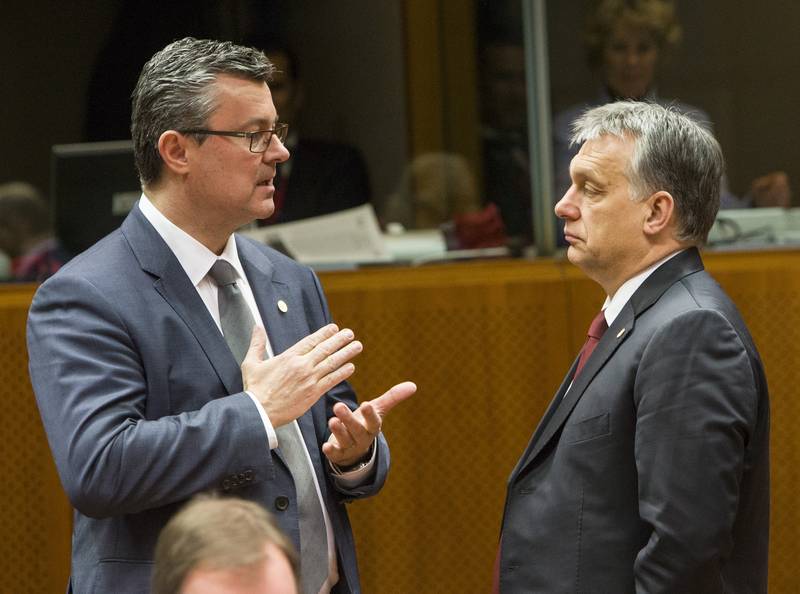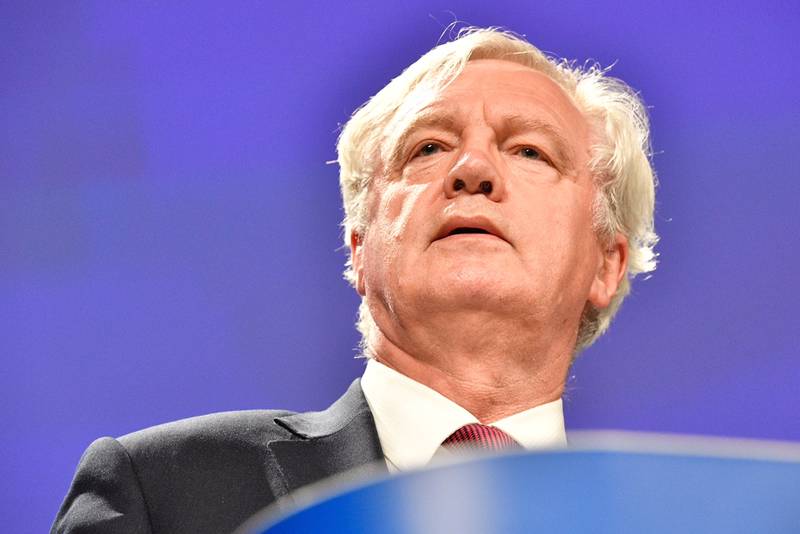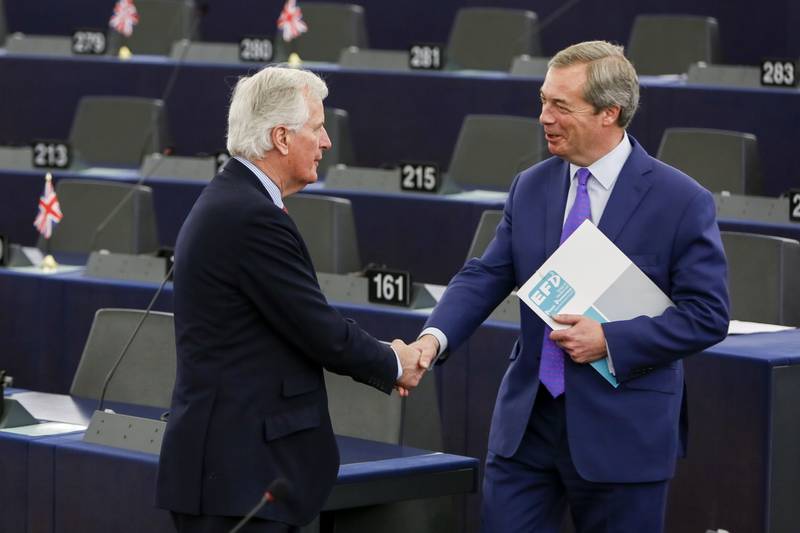The Genie of EU Change Unleashed
Adelina Marini, February 21, 2016
Weeks like the one between February 15 and 19, 2016 are extremely rare. Early on Monday morning a state, which is a proof that the EU is a peaceful project, filed its long-awaited membership application (Bosnia and Herzegovina), and in the late evening of Friday a country, which sees the EU just as a common market, got an answer to its application for semi-leaving (Great Britain). All of this while the woman, who the EU relies on for its survival, is eating French fries standing outside a cantina in the centre of Brussels (Angela Merkel). In the mean time, geopolitical storms continued to rage through the South East periphery. There are processes underway in Bulgaria, which are difficult to fathom, Croatia has fallen into a domestic amok, Serbia is preparing for the next high ranking Russian visit, while the celebration of Kosovo independence passed nearly unnoticed with new demonstrations and fireworks in the Kosovo parliament.

Deal, or no deal?
The latest EU summit, which was supposed to be entirely dedicated to the British question, set a new duration record. It lasted for more than 24 hours, during which British PM David Cameron led battles at several fronts, while the rest of the leaders were wondering what to do, first waiting for the English breakfast (cancelled), then for the English lunch (delayed several times), to go into an English dinner, whose starting hour no one dared forecast. This produced the photo-news of the week. Exhausted by hunger and waiting German Chancellor was “caught” eating French fries out of a paper bag in front of a cantina on the central Brussels Jourdan square, located close to the Consilium, where at the same time the prevailing feeling was that the film “The saving of Private Cameron” is being acted out.
There was something deeply symbolic in the actions of Angela Merkel. Just several hours later, on Friday night, the long-awaited news was broken: “we have a deal”. Do we? euinside will lay out in more detail what was agreed on in the beginning of next week, but the impressions from the first reading of the documents are that this "deal" on its own is nothing much, but sets the beginning of serious changes in the EU. The most profound changes in the initial proposal, presented by Donald Tusk on February 4 are connected with the fourth basket, meaning they concern the treating of newly arriving migrants from the EU into Great Britain and more. This could have serious repercussions to the entire EU and lay the foundation of new relationships among member states. The news is particularly unpleasant to countries that are yet to become EU members.

Negotiations with Great Britain were loudly announced by PM Cameron as securing a “special status” to Great Britain, while at the same time he continued claiming, after the government set a date for the membership referendum – June 23 – that the question now was whether the UK should stay in a reformed union or not. He admitted that what was negotiated could hardly be called a reform, but stated that the reform was yet to come. This hardly sounds encouraging to Angela Merkel, but could prove a good business perspective for Maison Antoine – the French fries shop on Jourdan square – more marathon negotiations for a reform, more customers willing to pop out for a life-saving bag of French fries. Pomme frite or French fries? It depends on whether Great Britain will vote to stay or leave, together with the unofficially recognised as lingua franca in the EU English language.
Despite setting a duration record, the start of the European Council once again demoted the British question to second after the refugee crisis, as euinside reported. The leaders extended the duration of their dinner on Thursday for six hours, discussing the old, but not implemented measures for dealing with the refugee crisis.
What Bosnia in what EU?
There could hardly be a “better” timing for Bosnia and Herzegovina filing a membership application – right in the week when everyone was busy with the Brexit. In the early Monday morning, the president of the country, Dragan Čović, filed the application, which was accepted coldly by the member states. You have reforms to implement, you have to survive as a federation, so you keep on working while we, too, are attempting to make reforms and survive. This could be a summary of the reactions to the official event. Bosnia filed its application in the dark – it does not know what it will look like in the future and the EU is not clear on its own future either. Regardless of that, however, the symbolism of the application is quite significant.

Serbia is expecting Medvedev
While the EU was battling for the remaining of Great Britain in the Union without upsetting the already shaky construction, there are strong geopolitical winds blowing in the Western Balkans. Serbian attention was fully occupied with preparations [in Serbian] for the official visit of Russian PM Dmitry Medvedev to Belgrade.

Do you remember Kosovo?
In the middle of all the mess, the anniversary of the Kosovo independence (February 17) went unnoticed. Even the latest episodes of rioting in the capital Priština and the Kosovar Parliament caused no attention. And Kosovo is a key element of European efforts, for the Union is engaged as a mediator in the dialogue between Belgrade and Priština. The leaders of the EU were too busy with their own problems, so they only paid attention to the latest portion of severe terrorist attacks in Turkey, which turned into a keystone to the survival of the EU, threatened by the refugee crisis. Events in Kosovo managed to produce a short statement by the spokesperson of the EU foreign office. The anniversary of the declaration of independence was not noted in a special statement. On the other hand, the EU summit began on Thursday with a declaration of the 28, condemning the terrorist attacks in Ankara. Size does matter, as the saying goes.
Kosovo declared independence on February 17, 2008 after intensive negotiations and initiatives by the international community. The state is not yet officially recognised by five EU members – Spain, Romania, Cyprus, Greece, and Slovakia. Kosovo is not recognised by Bosnia and Herzegovina as well. There is a good article [in Bulgarian] and a photo gallery on the anniversary and events in Kosovo in the Dnevnik newspaper.
Juncker caused a strong political quake in Bulgaria
On Monday morning, EC President Jean-Claude Juncker made a fateful statement after his meeting with Romanian PM Dacian Cioloş. In his opening words, he officially separated the ways of Bulgaria and Romania, which had been walking together in a package under the Cooperation and Verification Mechanism. Romania’s impressive results in the battle against corruption at the high levels of power are in sharp contrast with Bulgaria, which is sinking deeper and deeper into corruption, oligarchy, and organised crime. Juncker’s words caused initial turmoil, but later unleashed events that are difficult to apprehend. Prime Minister Boyko Borissov made a scandalous statement in front of journalists, announcing that every business in Bulgaria had its own media, he called them media baseball bats, and later stopped a large public procurement deal for the building of a motorway section.
No one guessed at the time that this was just the beginning of something really big. A series of cancellations of public procurement contracts followed, the strangest one being the tender for the cleaning of the Sofia airport, the stopping of which was provoked by a conversation with a janitor at the airport ,as Borissov himself announced. Meanwhile, in the public environment of the country a verbal war began between “media baseball bats”. The scandalous businessman/MP/magistrate and media owner Delyan Peevski announced he was selling his shares in one of the most controversial former state companies “Bulgartabak”, throwing more fog onto the already unclear situation.

The big question is whether PM Borissov took seriously Jean-Claude Juncker's words, who said he believed the Bulgarian Prime Minister would do whatever is necessary, or this is another faking of action, aimed at appeasing Brussels. And it could also turn out to be a shifting in layers and redistribution of positions. In any case, Bulgaria is a place which should remain under scrutiny in order to see exactly what is going on there and what consequences will it have, the more so because the interests of two large geopolitical players clash in the country – Turkey and Russia - paradoxically through one and the same political power – DPS (member of ALDE).
Croatia is falling into zero-gravity
What must be happening in a country so that the Prime Minister has to send an appeal on Facebook for tolerance and pluralism? This was done by the new Croatian PM, Tihomir Orešković, who wrote a short status on Facebook on Monday, appealing for pluralism and a break with the past. “I expect all participants in public communication to show tolerance to their opponent, facts and truth should be the basis for debates”. This statement came in the week when the division between Ustaše and Communists in Croatian society peaked. The week coincided with the celebration of the first year of the term of the first woman president of the country, Kolinda Grabar-Kitarović. On the event of the anniversary Ms Grabar-Kitarović gave an interview [in Croatian] to the Jutarnji list newspaper, in which she announced her sympathies to the Visegrad Four. She said she supported strengthening of relations with this group.
Scandals surrounding government members continued this week (you can read on the ones from last week here). And despite criticism against Minister of Culture Zlatko Hasanbegović continuing, the star of public criticism this week has been Education Minister Predrag Šustar, who turned to be an anti-Darwinist in some of his previous publications. His denial of human evolution and belief in the divine origin of the world were in the centre of attention in Croatia, even causing a symbolic action of burning books. Apart from the education minister, several other important news from Croatia caused scandals. Last weekend, First Deputy PM Tomislav Karamarko announced the necessity of changing the head of the national television and radio, after which an intention for changes in media laws was announced, making the association with the Polish-Hungarian scenario even stronger.

This opened up a huge discussion in the public domain and fed fuel to the fire of division, this time along the line of totalitarian against liberal views. Work started this week on a draft law for lustration, using the Czech experience as an example. All in all, it was a very tough week for PM Tihomir Orešković. He had to deal with internal struggles, which are totally alien to him, for he has spent his entire life outside Croatia (Canada), and his first appearance in a EU summit ran him into the even larger struggles at the European scene. This is probably the reason for his total confusion during his first BBC interview, in which he spoke of EU member states and members of the single market.
The EU summit will continue to resound throughout the following week, when its results will be subjected to debates in the European Parliament. Next week, the EU returns to its daily activities. An event worth following will be the meeting of ministers on justice and home affairs. It is yet to be seen what genie of changes did the leaders release from the bottle on Friday night, but euinside reasoned on a possible scenario this week.
Translated by Stanimir Stoev
 David Davis | © European Commission
David Davis | © European Commission Angela Merkel | © Council of the EU
Angela Merkel | © Council of the EU Michel Barnier, Nigel Farage | © European Parliament
Michel Barnier, Nigel Farage | © European Parliament Bakir Izetbegovic, Andrej Plenkovic | © Council of the EU
Bakir Izetbegovic, Andrej Plenkovic | © Council of the EU Aleksandar Vucic, Recep Tayyip Erdogan | © Serbian Presidency
Aleksandar Vucic, Recep Tayyip Erdogan | © Serbian Presidency Jean-Claude Juncker, Zoran Zaev | © European Commission
Jean-Claude Juncker, Zoran Zaev | © European Commission Kolinda Grabar-Kitarovic | © KGK
Kolinda Grabar-Kitarovic | © KGK Jozo Rados | © European Parliament
Jozo Rados | © European Parliament Aleksandar Vucic, Andrej Plenkovic | © Vlada RH
Aleksandar Vucic, Andrej Plenkovic | © Vlada RH